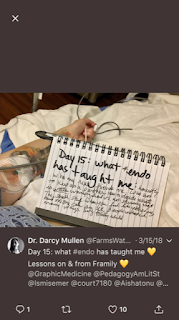[CW/TW: Depictions of self-harm, pain, reproductive organs, depression, & suicide]
There are all kinds of challenges/collective boot camps out there for writers and artists. NaNoWriMo gets you to produce a novel in a month. AcWriMo does the same thing for academic writing rather than fiction. An ArMo is for visual art. In the past I've done all three.
This March I did what I will always refer to as an EndoArMo. March being Endometriosis awareness month, someone had posted a month's worth of photo challenges. I think you were supposed to participate on Instagram, but I'm old and don't understand Instagram. So I did it on twitter and Facebook.
For mid-month, I already had surgery on the books for endometriosis, removal of a huge fibroid tumor (and some starts of tumors), and appendix (and other stuff). A coincidence I revised. EndoArMo.
People, friends and total strangers, started reaching out to me on social media and twitter. Some sent love, some had questions about the disease (IT IS A WEIRD DISEASE AND LARGELY CONFUSING TO ALL HUMANS!). Some expressed deep concern for me.
Basically: your art is making me worry about you and you don't seem okay. Well, good. I was communicating effectively. I wasn't okay. I was sitting on a painful (noncancerous) tumor, and my insides were all glued together. Of course I was NOT okay. I just hadn't said so.
I didn't want strangers, or friends, worrying about me. But I needed to be honest about endo.
Each day has "topics." Go search #theendophotochallenge. What you need to know: endometriosis is a disease that I have in/on/near my uterus. Anyone can get it, not just cis-women. It's complicated.
Positive reinforcement is not the norm for talking about one's uterus. Hell, having a uterus, or identifying as uterus-ish is a great way to catch hell on the internet. And IRL. I was taking a calculated risk in doing this, and I'm not good at math, so there we have it.
I started drawing as a way to keep busy when I was scared. As the countdown to surgery day started, I would wake up in the middle of the night thinking I was waking up, IRL, from anesthesia, thinking I had lost my uterus in surgery.
Panic and wailing in mourning until I realize it was only a nightmare. 3 to 6 times a night, everynight. Only a Nightmare.
My surgery was on the 14th, which was the cruelest of topics: "#14 a positive side to endo!" Well. That's both the mother of all coincidences, and the worst possible paradox to think on.
I had done some drawings presurgery. I knew I wouldn't be up for much. I skipped some days.
Once I could wield a phone, I made myself log in to social media, post, then slide into a nap.
The interactions that followed were a vital therapeutic lifeline in giving me a reason to get lucid. They were vital in giving me connections. If I try to explain the value of that I will sob and it still hurts too much to cry hard, so I can't try to explain it. Just thank you.
Early in my EndoArMo I joked with my doctors about how in anesthesia fog I might demand a letter of rec for med school to be a different kind of doctor, and work on endo. Ha ha. Medical school? No.
After that exchange I considered the tools I have, and how to use them on this disease.
Time moves, drawing/coloring/collage-ing starts helping me get my brain back. I learned about the graphic medicine community, its goals, and genres.
I need to get my hands on a copy of The Graphic Medicine Manifesto. (Not gonna be mad if a stranger mails me one to my office at Georgia Tech. Also, not gonna be mad if no one does. I'm still healing and way too tired to get idiomatically mad at much.)
I haven't really explained endo in this post, I know. I can't yet. Existing definitions are inadequate. I'm still healing and quite frankly I'm just thankful to be typing.
I started my EndoArMo without goals. I learned that I have a story I need to tell. A visual one.
This post is to show you some pictures, sentences frame them. I haven't hyperlinked where I should. This is the genre of oogy post-surgical writing. Forgive those conventions, and thank you for reading.


























